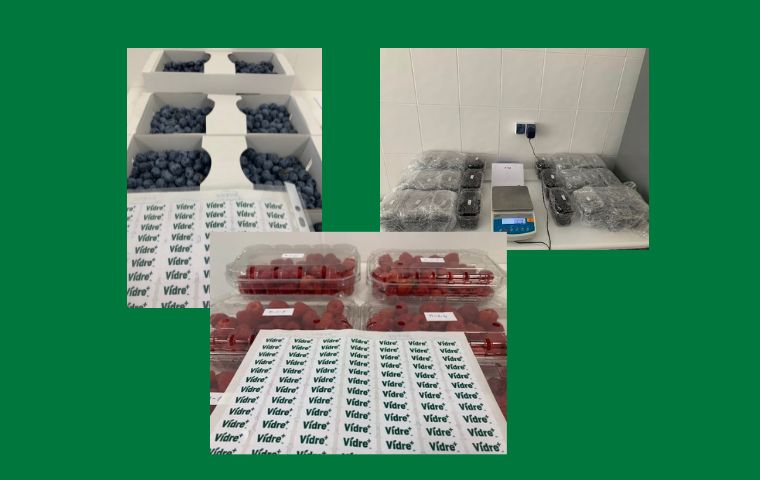
With growing demand and short harvest windows, blueberry producers are racing against time to deliver freshness. Technology could shift the game. Trials undertaken in 2022 using Vidre+™ technology featuring a patented 1-MCP delivery system revealed a slower ripening process in blueberries. Protected fruits retained firmness, lost less weight, and maintained eating quality far longer than berries that were not protected by Vidre+™.

Graph 1. Fruit quality 1-4. 4 = excellent eating quality, 3 = good eating quality, 2 = moderate eating quality, and 1 = poor eating quality. See the details of the trial’s result here.
Raspberries: delicate, delicious, and loved worldwide. But behind their sweet appeal lies a well-known challenge: they spoil quickly. Their fragile nature makes it difficult to transport and deliver high-quality berries to the consumer. As demand for high-quality, fresh produce continues to grow, farmers and producers are constantly seeking better ways to protect their crops and reduce waste. That’s where innovation may step in. Research conducted in the summer season of 2022 has revealed a promising solution. Using Vidre+™ technology, researchers found that treated raspberries maintained good eating quality for up to 20 days, doubling the shelf life compared to untreated fruit, which began losing quality after just 10 days. Not only did the treated berries stay fresher longer, but they also retained their firmness, flavor, and vitamin content. For an industry shaped by time and perishability, Vidre+™ technology could deliver something truly valuable: more time to deliver the best berries possible, from farm to table.

Graph 2. See details of trial results here
Demand for fresh sweet cherries is driven by health-conscious consumers seeking nutritious, natural food options. According to Verified Market Research, the fresh cherry market was valued at USD 58 billion in 2022 and is projected to reach USD 95 billion by 2030. Cherries are loved for their sweet flavor, health benefits, and versatility. However, their limited shelf life — especially under challenging conditions like excessive heat — remains a key obstacle in storage and distribution. Vidre+ technology was tested during the summer of 2022 on sweet cherries of the Kordia and Regina varieties, yielding some promising results, including reduced weight loss and dehydration, improved fruit quality, less stem browning, and more.

Photos: Kordia cherries after 17 Days of Cold Storage. Note: greater stem yellowing/browning and pitting in untreated cherries. See details of trial results here
One of our key motivations at Fresh Inset is helping reduce global food waste by keeping fresh produce and flowers fresher for longer. That’s one of the driving forces behind our development of Vidre+™ technology. Our solution is designed for the protection of fresh produce and flowers from the harmful effects of ethylene, a natural plant hormone that speeds up ripening and spoilage. Vidre+™ technology integrates slow-release 1-MCP into packaging solutions, which protects the fruit from ethylene’s impact thereby protecting the products’ freshness.
For growers and distributors, it means better product quality over long-distance transport. For retailers, fewer markdowns. And for the planet? Less waste, lower emissions, and a more sustainable food system.
Let’s protect produce by keeping its freshness and take more time to enjoy the best of summer.
If you are interested in expanding your knowledge about Vidre+™ technology, follow us on LinkedIn or get in touch: krzysztof.czaplicki@freshinset.com.
———————————————————————–
The results presented in this article are based on various single studies. Please note that these are preliminary findings. Additional studies may provide further insights and perspectives.
Sources or results.
The researches quoted in this article were conducted by a team of experienced scientists led by Dorota Wichrowska, PhD, from the University of Life Sciences in Bydgoszcz, Poland, in the summer of 2022. More details can be found on the Fresh Inset blog: https://freshinset.com/blog-and-news/